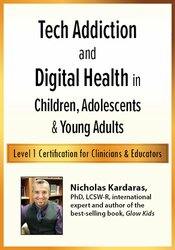

We are on the verge of a global public health crisis – and the kids, teens and young adults you work with are at the greatest risk.
Young people are living their lives in front of a screen with disastrous results. ADHD, depression, suicidality, anxiety, sleep irregularities, thought disorders, and stunted social skills are rising dramatically. But whether you’re a mental health professional or school-based professional the resources available have lacked the concrete strategies and real-life interventions you need to effectively intervene in this growing epidemic.
Dr. Nicholas Kardaras is an internationally renowned expert on tech addition, author of the best-selling book Glow Kids, and executive director of one of the world’s top rehabs, The Dunes in East Hampton, NY.
Join him in this Certification recording and get the most effective tools, strategies and techniques you need to help children, adolescents, young adults and families hijacked by technology addiction and overuse.
You will discover:
Best of all, completion of this training meets the educational requirements should you choose to apply to become a Certified Digital Health and Wellness Level 1 Professional (CDHWP) through the National Institute for Digital Health and Wellness (NIDHW). To learn more about how you can apply for CDHWP certification and distinguish yourself from other professionals, visit www.nidhw.org.
Purchase today and finish feeling prepared and confident in your ability to lead young people hijacked by tech overuse on the path to a better life!
Continuing education credit information is coming soon for this non-interactive self-study package.
CEs may be available for select professions, as listed in the target audience. Hours will be dependent on the actual recording time. Please check with your state licensing board or organization for specific requirements.
There may be an additional fee for CE certificates. Please contact our Customer Service at 1-800-844-8260 for more details.
**Materials that are included in this course may include interventions and modalities that are beyond the authorized practice of your profession. As a licensed professional, you are responsible for reviewing the scope of practice, including activities that are defined in law as beyond the boundaries of practice in accordance with and in compliance with your professions standards.
| File type | File name | Number of pages | |
|---|---|---|---|
| Manual - Tech Addiction and Digital Health in Children, Adolescents & Young Adults (14.1 MB) | 59 Pages | Available after Purchase |

Nicholas Kardaras, PhD, LCSW-R, is an Ivy League educated psychologist, best-selling author, internationally renowned speaker and an expert on mental health, addiction, and the impacts of our digital age. He has developed clinical treatment programs all over the country and is the founder and chief clinical officer of Maui Recovery in Hawaii, Omega Recovery in Austin, and the Launch House in New York.
Dr. Kardaras is a former clinical professor at Stony Brook Medicine where he specialized in teaching the neurophysiology and treatment of addiction. He has also taught neuropsychology at the doctoral-level and has worked closely in developing clinical protocols with Dr. Howard Shaffer, associate professor at Harvard Medical School and the director of their Division of Addiction.
Dr. Kardaras is the best-selling author of Glow Kids (St. Martin’s Press, 2016), has written for TIME magazine, Scientific American, Psychology Today, Salon, the NY Daily News, and Fox News, and has appeared on ABC’s 20/20, Good Morning America, the CBS Evening News, Fox & Friends, NPR, Good Day New York and in New York magazine and Vanity Fair. He was featured on the 2019 A&E TV Series Digital Addiction and his 2016 NY Post Op Ed “Digital Heroin” went viral with over six million views and shares.
Speaker Disclosures:
|
Tech Addiction & Digital Health in Children, Adolescents & Young Adults: Level 1 Certification for Clinicians & Educators
Copyright: 04/13/2023 - Product Code POS056045 |
Access never expires for this product.
| 5 |
|
| 4 |
|
| 3 |
|
| 2 |
|
| 1 |
|
Satisfaction Guarantee
Your satisfaction is our goal and our guarantee. Concerns should be addressed to: PO Box 1000, Eau Claire, WI 54702-1000 or call 1-800-844-8260.
ADA Needs
We would be happy to accommodate your ADA needs; please call our Customer Service Department for more information at 1-800-844-8260.
PESI Mobile App
Access CE trainings on your phone or tablet through our free mobile app. Choose video or audio-only versions of online courses from the world’s best instructors, and complete your CE requirements anywhere, anytime, at your own pace.
Please wait ...